- Home
- Don DeLillo
Falling Man Page 20
Falling Man Read online
Page 20
One night he sat in his room doing the old exercises, the old rehab program, bend of the wrist toward the floor, bend of the wrist toward the ceiling. Room service ended at midnight. Midnight TV showed soft-core films with naked women and penis-less men. He was not lost or bored or crazy. Thursday tournament started at three, sign-ups at noon. Friday tournament started at noon, sign-ups at nine.
He was becoming the air he breathed. He moved in a tide of noise and talk made to his shape. The look under the thumb at ace-queen. Along the aisles, roulette wheels clicking. He sat in the sports book unaware of scores or odds or point spreads. He watched the miniskirted women serving drinks. Out on the Strip a dead and heavy heat. He folded eight or nine hands in a row. He stood in the sportswear shop wondering what he might buy for the kid. There were no days or times except for the tournament schedule. He wasn’t making enough money to justify this life on a practical basis. But there was no such need. There should have been but wasn’t and that was the point. The point was one of invalidation. Nothing else pertained. Only this had binding force. He folded six more hands, then went all-in. Make them bleed. Make them spill their precious losers’ blood.
These were the days after and now the years, a thousand heaving dreams, the trapped man, the fixed limbs, the dream of paralysis, the gasping man, the dream of asphyxiation, the dream of helplessness.
A fresh deck rose to the tabletop.
Fortune favors the brave. He didn’t know the Latin original of the old adage and this was a shame. This is what he’d always lacked, that edge of unexpected learning.
She was only a girl, always a daughter, and her father was drinking a Tanqueray martini. He’d let her add a twist of lemon, giving her comically detailed instructions. Human existence, that was his subject this evening, on the deck of somebody’s beat-up house in Nantucket. Five adults, the girl on the fringes. Human existence had to have a deeper source than our own dank fluids. Dank or rank. There had to be a force behind it, a principal being who was and is and ever shall be. She loved the sound of that, like chanted verse, and thought of it now, alone, over coffee and toast, and something else as well, the existence that hummed in the words themselves, was and is, and how the chill wind died at nightfall.
People were reading the Koran. She knew of three people doing this. She’d talked to two and knew of another. They’d bought English-language editions of the Koran and were trying earnestly to learn something, find something that might help them think more deeply into the question of Islam. She didn’t know whether they were persisting in the effort. She could imagine herself doing this, the determined action that floats into empty gesture. But maybe they were persisting. They were serious people perhaps. She knew two of them but not well. One, a doctor, recited the first line of the Koran in his office.
This Book is not to be doubted.
She doubted things, she had her doubts. She took a long walk one day, uptown, to East Harlem. She missed her group, the laughter and cross talk, but knew all along this wasn’t just a walk, a matter of old times and places. She thought of the resolute hush that fell over the room when members took up pens and began to write, oblivious to the clamor around them, rap singers down the hall, barely school age, polishing their lyrics, or workers drilling and hammering on the floor above. She was here to look for something, a church, near the community center, Catholic, she thought, and it may have been the church that Rosellen S. used to go to. She wasn’t sure but thought it might be, made it be, said it was. She missed the faces. Your face is your life, her mother said. She missed the forthright voices that began to warp and fade, lives that dwindled into whisper.
She had normal morphology. She loved that word. But what’s inside the form and structure? This mind and soul, hers and everyone’s, keep dreaming toward something unreachable. Does this mean there’s something there, at the limits of matter and energy, a force responsible in some way for the very nature, the vibrancy of our lives from the mind out, the mind in little pigeon blinks that extend the plane of being, out beyond logic and intuition.
She wanted to disbelieve. She was an infidel in current geopolitical parlance. She remembered how her father, how Jack’s face went bright and hot, appearing to buzz with electric current after a day in the sun. Look around us, out there, up there, ocean, sky, night, and she thought about this, over coffee and toast, how he believed that God infused time and space with pure being, made stars give light. Jack was an architect, an artist, a sad man, she thought, for much of his life, and it was the kind of sadness that yearns for something intangible and vast, the one solace that might dissolve his paltry misfortune.
But this was crap, wasn’t it, night skies and divinely inspired stars. A star makes its own light. The sun is a star. She thought of Justin night before last, singing his homework. This meant he was bored, alone, in his room, making up monotone songs of addition and subtraction, presidents and vice-presidents.
Others were reading the Koran, she was going to church. She took a taxi uptown, weekdays, two or three times a week, and sat in the nearly empty church, Rosellen’s church. She followed others when they stood and knelt and she watched the priest celebrate the mass, bread and wine, body and blood. She didn’t believe this, the transubstantiation, but believed something, half fearing it would take her over.
She ran along the river, early light, before the kid was awake. She thought of training for the marathon, not this year’s but next, the pain and rigor of it, long-distance running as spiritual effort.
She thought of Keith with a call girl in his room, having automated teller sex.
After mass she tried to hunt down a taxi. Taxis were scarce here and the bus took forever and she wasn’t ready yet to take the subway.
This Book is not to be doubted.
She was stuck with her doubts but liked sitting in church. She went early, before mass began, to be alone for a while, to feel the calm that marks a presence outside the nonstop riffs of the waking mind. It was not something godlike she felt but only a sense of others. Others bring us closer. Church brings us closer. What did she feel here? She felt the dead, hers and unknown others. This is what she’d always felt in churches, great bloated cathedrals in Europe, a small poor parish church such as this one. She felt the dead in the walls, over decades and centuries. There was no dispiriting chill in this. It was a comfort, feeling their presence, the dead she’d loved and all the faceless others who’d filled a thousand churches. They brought intimacy and ease, the human ruins that lie in crypts and vaults or buried in churchyard plots. She sat and waited. Soon someone would enter and walk past her into the nave. She was always the first, always seated toward the rear, breathing the dead in candlewax and incense.
She thought of Keith and then he called. He said he’d be able to get home for a few days in a week or so and she said okay, good.
She saw the gray that was beginning to seep into her hair at the scalp. She would not stain it away. God, she thought. What does it mean to say that word? Are you born with God? If you never hear the word or observe the ritual, do you feel the breath alive inside you, in brain waves or pounding heart?
Her mother had a mane of white hair at the end, the body slowly broken, haunted by strokes, blood in the eyes. She was drifting into spirit life. She was a spirit woman now, barely able to make a sound that might pass for a word. She lay shrunken in bed, all that was left of her framed by the long straight hair, frosted white in sunlight, beautiful and otherworldly.
She sat in the empty church waiting for the pregnant woman to enter or maybe the old man who always nodded to her. One woman, then the other, or one woman and then the man. They’d established a pattern, these three, or nearly so, and then others entered and the mass began.
But isn’t it the world itself that brings you to God? Beauty, grief, terror, the empty desert, the Bach cantatas. Others bring you closer, church brings you closer, the stained glass windows of a church, the pigments inherent in the glass, the metallic oxides fused onto th
e glass, God in clay and stone, or was she babbling to herself to pass the time?
She walked home from church when there was time but otherwise tried to find a cab, tried to talk to the driver, who was in the twelfth hour of his shift and wanted only to finish without dying.
She stayed away from the subway, still, and never stopped noticing the concrete bulwarks outside train stations and other possible targets.
She ran early mornings and came home and stripped and showered. God would consume her. God would de-create her and she was too small and tame to resist. That’s why she was resisting now. Because think about it. Because once you believe such a thing, God is, then how can you escape, how survive the power of it, is and was and ever shall be.
He sat alongside the table, facing the dusty window. He placed his left forearm along the near edge of the table, hand dangling from the adjoining edge. This was the tenth day of twice-a-day, the wrist extensions, the ulnar deviations. He counted the days, the times per day.
There was no problem with the wrist. The wrist was fine. But he sat in his hotel room, facing the window, hand curled into a gentle fist, thumb up in certain setups. He recalled phrases from the instruction sheet and recited them quietly, working on the hand shapes, the bend of the wrist toward the floor, the bend of the wrist toward the ceiling. He used the uninvolved hand to apply pressure to the involved hand.
He sat in deep concentration. He recalled the setups, every one, and the number of seconds for each, and the number of repetitions. With your palm down, bend your wrist toward the floor. With your forearm resting sideways, bend your wrist toward the floor. He did the wrist flexions, the radial deviations.
Mornings without fail, every night when he returned. He looked into the dusty glass, reciting fragments from the instruction sheet. Hold to a count of five. Repeat ten times. He did the full program every time, hand raised, forearm flat, hand down, forearm sideways, slowing the pace just slightly, day to night and then again the following day, drawing it out, making it last. He counted the seconds, he counted the repetitions.
There were nine people at mass today. She watched them stand, sit and kneel and she did what they did but failed to respond as they did when the priest recited lines from the liturgy.
She thought that the hovering possible presence of God was the thing that created loneliness and doubt in the soul and she also thought that God was the thing, the entity existing outside space and time that resolved this doubt in the tonal power of a word, a voice.
God is the voice that says, “I am not here.”
She was arguing with herself but it wasn’t argument, just the noise the brain makes.
She had normal morphology. Then one late night, undressing, she yanked a clean green T-shirt over her head and it wasn’t sweat she smelled or maybe just a faint trace but not the sour reek of the morning run. It was just her, the body through and through. It was the body and everything it carried, inside and out, identity and memory and human heat. It wasn’t even something she smelled so much as knew. It was something she’d always known. The child was in it, the girl who wanted to be other people, and obscure things she could not name. It was a small moment, already passing, the kind of moment that is always only seconds from forgetting.
She was ready to be alone, in reliable calm, she and the kid, the way they were before the planes appeared that day, silver crossing blue.
IN THE HUDSON CORRIDOR
The aircraft was secured now and he sat in the jump seat across from the forward galley, keeping watch. He was either supposed to keep watch here, outside the cockpit, or to patrol the aisle, box cutter in hand. He was not confused, only catching a breath, taking a moment. This is when he felt a sensation high on his arm, the thin wincing pain of slit skin.
He sat facing a bulkhead, with the toilet behind him, first-class only.
The air was thick with the Mace he’d sprayed and there was somebody’s blood, his blood, draining through the cuff of his long-sleeved shirt. It was his blood. He didn’t look for the source of the wound but saw more blood beginning to show through the sleeve up toward the shoulder. He thought that maybe the pain had been there earlier but he was only now remembering to feel it. He didn’t know where the box cutter was.
If other things were normal, in his understanding of the plan, the aircraft was headed toward the Hudson corridor. This was the phrase he’d heard from Amir many times. There was no window he might look through without getting out of the seat and he felt no need to do that.
He had his cell phone on vibrate.
Everything was still. There was no sensation of flight. He heard noise but felt no motion and the noise was the kind that overtakes everything and seems completely natural, all the engines and systems that become the air itself.
Forget the world. Be unmindful of the thing called the world.
All of life’s lost time is over now.
This is your long wish, to die with your brothers.
His breath came in short bursts. His eyes were burning. When he looked left, partway, he could see an empty seat in the first-class cabin, on the aisle. Straight ahead, the bulkhead. But there was a view, there was a scene of clear imagining out the back of his head.
He didn’t know how he’d been cut. He’d been cut by one of his brothers, how else, accidentally, in the struggle, and he welcomed the blood but not the pain, which was becoming hard to bear. Then he thought of something he’d long forgotten. He thought of the Shia boys on the battlefield in the Shatt al Arab. He saw them coming out of trenches and redoubts and running across the mudflats toward enemy positions, mouths open in mortal cry. He took strength from this, seeing them cut down in waves by machine guns, boys in the hundreds, then the thousands, suicide brigades, wearing red bandannas around their necks and plastic keys underneath, to open the door to paradise.
Recite the sacred words.
Pull your clothes tightly about you.
Fix your gaze.
Carry your soul in your hand.
He believed he could see straight into the towers even though his back was to them. He didn’t know the aircraft’s location but believed he could see straight out the back of his head and through the steel and aluminum of the aircraft and into the long silhouettes, the shapes, the forms, the figures coming closer, the material things.
The pious ancestors had pulled their clothes tightly about them before battle. They were the ones who named the way. How could any death be better?
Every sin of your life is forgiven in the seconds to come.
There is nothing between you and eternal life in the seconds to come.
You are wishing for death and now it is here in the seconds to come.
He began to vibrate. He wasn’t sure whether it was the motion of the plane or only himself. He rocked in his seat, in pain. He heard sounds from somewhere in the cabin. The pain was worse now. He heard voices, excited cries from the cabin or the cockpit, he wasn’t sure. Something fell off the counter in the galley.
He fastened his seatbelt.
A bottle fell off the counter in the galley, on the other side of the aisle, and he watched it roll this way and that, a water bottle, empty, making an arc one way and rolling back the other, and he watched it spin more quickly and then skitter across the floor an instant before the aircraft struck the tower, heat, then fuel, then fire, and a blast wave passed through the structure that sent Keith Neudecker out of his chair and into a wall. He found himself walking into a wall. He didn’t drop the telephone until he hit the wall. The floor began to slide beneath him and he lost his balance and eased along the wall to the floor.
He saw a chair bounce down the corridor in slow motion. He thought he saw the ceiling begin to ripple, lift and ripple. He put his arms over his head and sat knees up, face wedged between them. He was aware of vast movement and other things, smaller, unseen, objects drifting and skidding, and sounds that weren’t one thing or another but only sound, a shift in the basic arrangement of parts and elements.
The movement was beneath him and then all around him, massive, something undreamed. It was the tower lurching. He understood this now. The tower began a long sway left and he raised his head. He took his head out of his knees to listen. He tried to be absolutely still and tried to breathe and tried to listen. Out past the office door he thought he saw a man on his knees in the first pale wave of smoke and dust, a figure deep in concentration, head up, jacket halfway off, dangling from one shoulder.
In time he felt the tower stop leaning. The lean felt forever and impossible and he sat and listened and after a while the tower began to roll slowly back. He didn’t know where the phone was but he could hear a voice on the other end, still there, somewhere. He saw the ceiling begin to ripple. The stink of something familiar was everywhere but he didn’t know what it was.
When the tower swung finally back to vertical he pushed himself off the floor and moved to the doorway. The ceiling at the far end of the hall moaned and opened. The stress was audible and then it opened, objects coming down, panels and wallboard. Plaster dust filled the area and there were voices along the hall. He was losing things as they happened. He felt things come and go.
The man was still there, kneeling in the doorway of the office opposite, thinking hard about something, blood showing through his shirt. He was a client or consulting attorney and Keith knew him slightly and they exchanged a look. No telling what it meant, this look. There were people calling along the hall. He took his jacket off the door. He reached behind the door and took his jacket from the hook, not sure why he was doing this but not feeling stupid about it, forgetting to feel stupid.
He went down the hall, putting on the jacket. There were people moving toward the exits, in the other direction, moving, coughing, helping others. They stepped over debris, faces showing stark urgency. This was the knowledge in every face, the distance they had to cover to street level. They spoke to him, one or two, and he nodded back or didn’t. They spoke and looked. He was the guy who thought jackets were required, the guy going the wrong way.

 Great Jones Street (Contemporary American Fiction)
Great Jones Street (Contemporary American Fiction)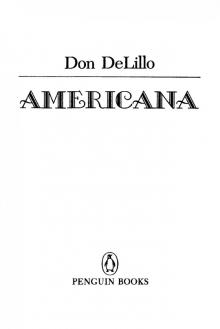 Americana
Americana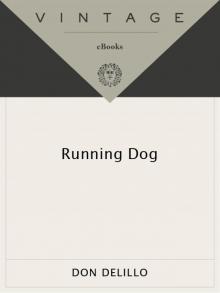 Running Dog
Running Dog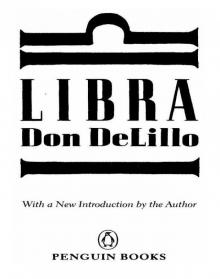 Libra
Libra End Zone
End Zone Ratner's Star
Ratner's Star Underworld
Underworld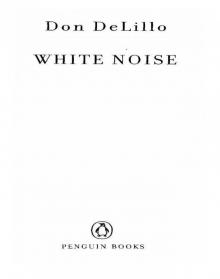 White Noise
White Noise Players
Players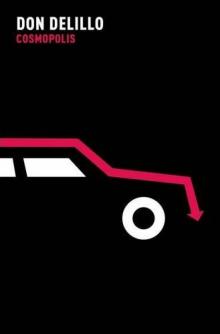 Cosmopolis
Cosmopolis The Silence
The Silence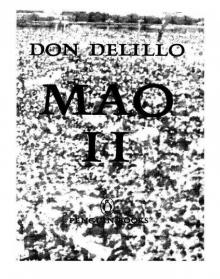 Mao II
Mao II Zero K
Zero K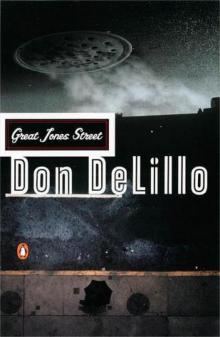 Great Jones Street
Great Jones Street The Angel Esmeralda
The Angel Esmeralda The Names
The Names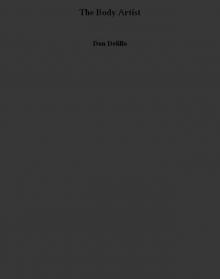 The Body Artist
The Body Artist Point Omega
Point Omega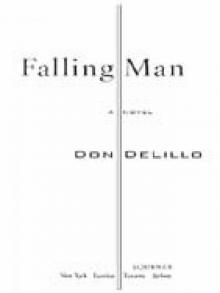 Falling Man
Falling Man